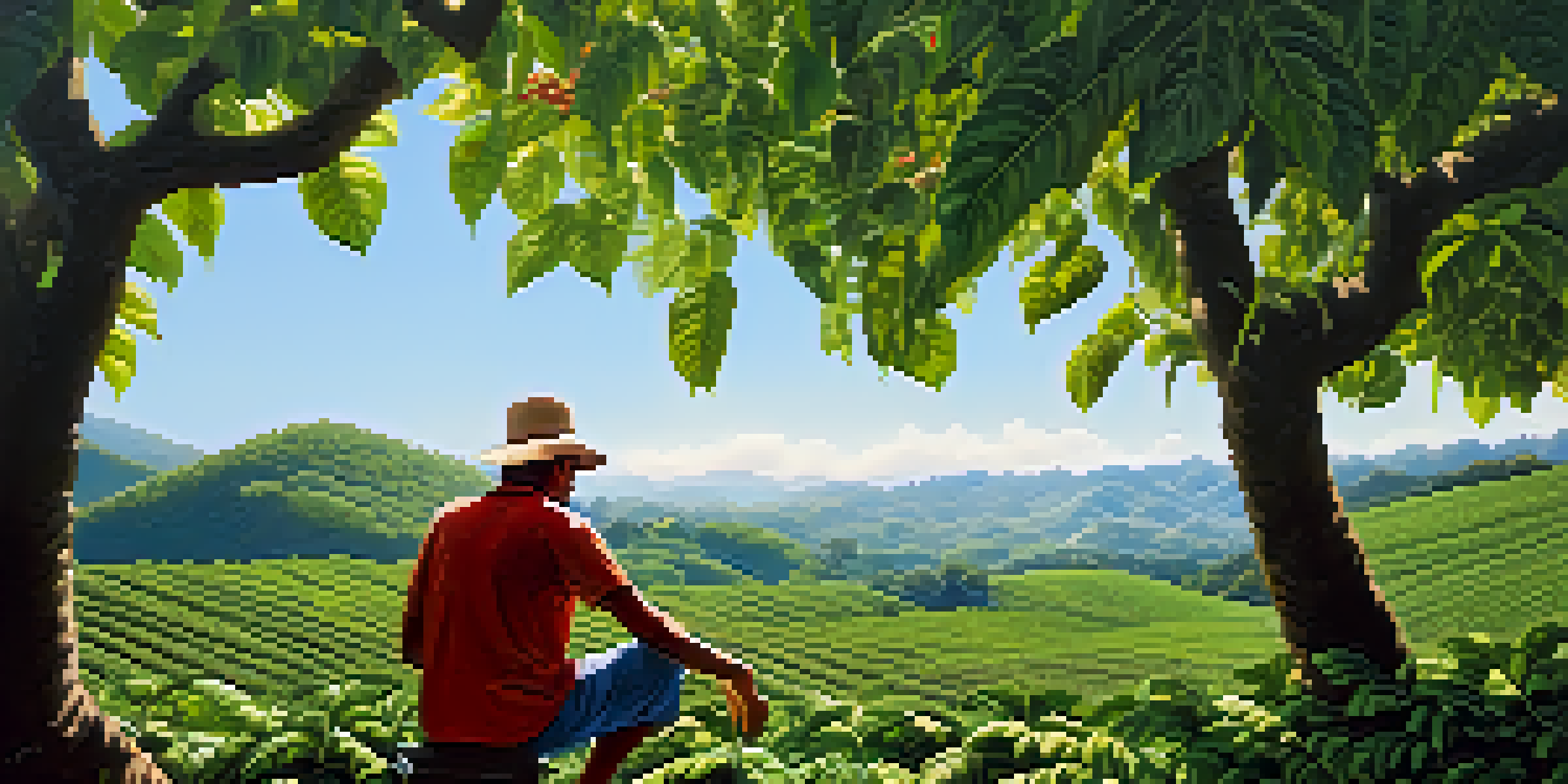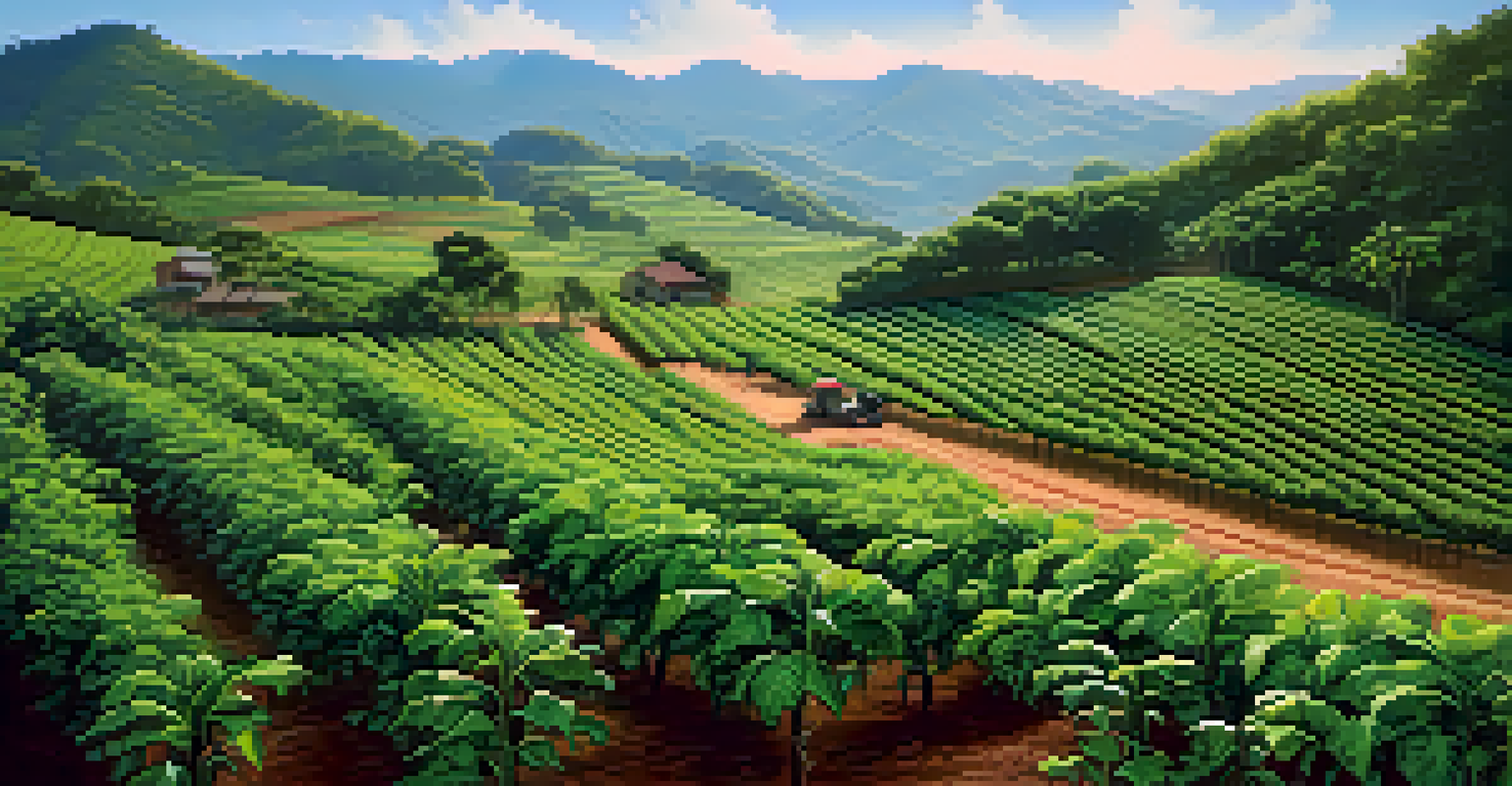Sustainable Practices in Brazil's Coffee Plantations

The Importance of Sustainability in Coffee Production
Sustainability in coffee production is crucial for the environment, farmers, and consumers alike. Coffee is one of the most traded commodities in the world, and its cultivation can significantly impact ecosystems. Sustainable practices help reduce carbon footprints and protect biodiversity, ensuring that coffee can continue to thrive for future generations.
Sustainability is not a destination, it's a journey we've all got to take together.
In Brazil, which is the largest coffee producer globally, these practices are becoming increasingly important. By prioritizing sustainability, Brazilian farmers are not only preserving their land but also increasing the quality of their coffee. Ultimately, sustainable coffee production aligns with the growing consumer demand for environmentally friendly products.
Embracing sustainable methods leads to healthier ecosystems and promotes the well-being of local communities. This means better living conditions for farmers and their families, while also catering to coffee lovers who want to make responsible choices. The ripple effect of sustainable practices can create a positive impact far beyond the coffee cup.
Agroforestry: A Key Sustainable Practice
Agroforestry is a brilliant approach that combines agriculture and forestry, and it's gaining traction in Brazil’s coffee plantations. By planting coffee under the canopy of trees, farmers can create a more diverse ecosystem that benefits both crops and wildlife. This method not only improves soil health but also provides shade for coffee plants, which can enhance flavor profiles.

Incorporating trees into coffee farms helps to sequester carbon dioxide, combat soil erosion, and maintain water cycles. This balance allows farmers to produce high-quality coffee while protecting the environment. Moreover, agroforestry can create additional income streams through the harvest of timber or fruits from the trees.
Sustainability Benefits All Stakeholders
Sustainable coffee production supports the environment, enhances coffee quality, and meets consumer demand for eco-friendly products.
Farmers who adopt agroforestry also contribute to preserving biodiversity. The variety of plants and animals that thrive on these farms can lead to healthier ecosystems, which ultimately supports better coffee production. This interconnectedness illustrates the beauty of sustainable farming practices.
Organic Farming Techniques in Coffee Cultivation
Organic farming is another sustainable practice that has gained popularity in Brazil's coffee plantations. By avoiding synthetic fertilizers and pesticides, farmers can produce coffee that's healthier for consumers and kinder to the environment. This method not only reduces chemical runoff but also promotes healthier soil and ecosystems.
The greatest threat to our planet is the belief that someone else will save it.
Brazilian coffee farmers implementing organic practices often see a boost in biodiversity on their farms. Beneficial insects and microorganisms thrive without chemicals, helping to control pests naturally. This can lead to a more resilient coffee crop that's less susceptible to diseases, creating a win-win situation for farmers and the environment.
Moreover, organic coffee often appeals to health-conscious consumers who are willing to pay a premium for sustainably produced products. This opens up new markets for Brazilian coffee growers, providing them with the financial incentive to adopt organic practices. As a result, the demand for organic coffee continues to rise, further encouraging sustainable agriculture.
Water Conservation Efforts in Coffee Growing Regions
Water conservation is a critical concern for coffee farmers in Brazil, especially during dry seasons. Many coffee-growing regions face challenges related to water scarcity, making efficient water use essential. Farmers are adopting techniques such as drip irrigation and rainwater harvesting to minimize water waste.
By using drip irrigation systems, farmers can deliver water directly to the roots of coffee plants, significantly reducing evaporation and runoff. This targeted approach not only conserves water but also promotes healthier plants, leading to better yields. Rainwater harvesting systems allow farmers to capture and store rain for later use, ensuring a steady water supply throughout the year.
Agroforestry Enhances Ecosystems
By integrating trees into coffee farming, agroforestry improves soil health and biodiversity, benefiting both crops and wildlife.
Implementing these water conservation practices not only benefits coffee production but also supports local communities facing water shortages. By prioritizing water efficiency, Brazilian coffee growers can mitigate the impact of climate change and secure their livelihoods for the long term. This commitment to sustainability exemplifies the forward-thinking nature of Brazil's coffee industry.
Community Engagement and Empowerment Initiatives
Community engagement plays a pivotal role in promoting sustainable practices among Brazil's coffee farmers. Many cooperatives are emerging, bringing together farmers to share knowledge, resources, and sustainable techniques. This collaborative approach empowers farmers to adopt practices that benefit both their farms and their communities.
Through educational workshops and training sessions, farmers learn about the economic and environmental advantages of sustainability. These initiatives often emphasize the importance of quality over quantity, encouraging farmers to focus on producing premium coffee that meets market demand. As a result, farmers gain confidence in their abilities and become advocates for sustainability.
Furthermore, community engagement fosters a sense of belonging and shared purpose among farmers. When they work together, they can leverage their collective strength to tackle challenges such as climate change and market fluctuations. This unity not only enhances coffee production but also strengthens the social fabric of rural communities.
Certification Programs Supporting Sustainable Coffee
Certification programs are essential in promoting sustainable practices in Brazil's coffee industry. Certifications like Rainforest Alliance and Fair Trade encourage farmers to adopt environmentally friendly and socially responsible practices. These labels provide consumers with a way to support sustainable coffee and ensure that their purchases contribute to positive impacts.
For farmers, obtaining certification can open doors to new markets and higher prices for their coffee. This financial incentive motivates many growers to invest in sustainable practices, leading to a healthier environment and better livelihoods. Certifications also help raise awareness about sustainability issues, encouraging consumers to make mindful choices.
Technology Drives Sustainable Practices
Innovations like precision agriculture and mobile apps empower Brazilian farmers to optimize resources and maintain sustainable practices.
The process of certification can be demanding, requiring farmers to meet specific criteria and maintain records. However, the long-term benefits often outweigh the challenges. By participating in these programs, Brazilian coffee farmers can become part of a global movement towards sustainability and social equity.
The Role of Technology in Sustainable Coffee Practices
Technology is transforming the landscape of sustainable coffee farming in Brazil. From precision agriculture tools to mobile apps, farmers are using innovations that help them manage their resources more efficiently. These technologies can provide real-time data on soil health, weather patterns, and pest management, enabling farmers to make informed decisions.
For instance, drones are being utilized to monitor crop health from above, allowing farmers to identify areas that need attention without extensive manual labor. Additionally, mobile apps can help farmers track their sustainability practices, making it easier to maintain certifications and meet consumer demands. This integration of technology is enhancing productivity while minimizing environmental impact.

Moreover, technology connects farmers to global markets and consumers, fostering transparency and trust. By sharing their sustainable practices through digital platforms, Brazilian coffee growers can engage directly with consumers who care about where their coffee comes from. This connection not only supports sales but also builds a community around sustainable coffee.
The Future of Sustainable Coffee in Brazil
As sustainability becomes a pressing global concern, the future of coffee production in Brazil looks promising. With a growing emphasis on eco-friendly practices, Brazilian farmers are well-positioned to lead the way in sustainable coffee cultivation. The commitment to agroforestry, organic farming, and water conservation sets a strong foundation for continuous improvement.
Consumers are increasingly seeking sustainable products, and this trend is likely to shape the coffee market moving forward. Coffee brands that prioritize sustainability will not only attract environmentally conscious consumers but also contribute to the well-being of farmers and ecosystems. This shift presents an opportunity for Brazil to strengthen its reputation as a leader in sustainable coffee.
Ultimately, the journey towards sustainability in Brazil's coffee plantations requires ongoing collaboration among farmers, consumers, and organizations. By embracing innovative practices and fostering community engagement, the country can ensure that its coffee industry thrives sustainably for generations to come. This collective effort can transform Brazil's coffee landscape into a model for sustainable agriculture worldwide.